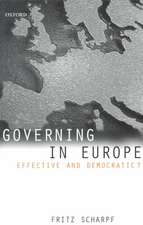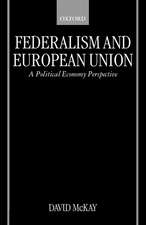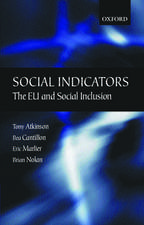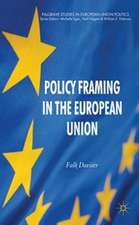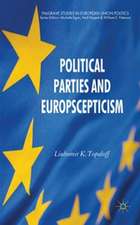European Regulatory Agencies in EU Decision-Making: Between Expertise and Influence: European Administrative Governance
Autor Christoph Ossegeen Limba Engleză Hardback – 6 ian 2016
Din seria European Administrative Governance
- 17%
 Preț: 460.49 lei
Preț: 460.49 lei -
 Preț: 380.07 lei
Preț: 380.07 lei -
 Preț: 385.84 lei
Preț: 385.84 lei -
 Preț: 388.72 lei
Preț: 388.72 lei -
 Preț: 390.63 lei
Preț: 390.63 lei -
 Preț: 385.47 lei
Preț: 385.47 lei -
 Preț: 388.52 lei
Preț: 388.52 lei - 18%
 Preț: 1234.14 lei
Preț: 1234.14 lei - 15%
 Preț: 641.53 lei
Preț: 641.53 lei -
 Preț: 381.59 lei
Preț: 381.59 lei -
 Preț: 386.00 lei
Preț: 386.00 lei -
 Preț: 386.39 lei
Preț: 386.39 lei - 18%
 Preț: 722.58 lei
Preț: 722.58 lei - 15%
 Preț: 695.34 lei
Preț: 695.34 lei - 18%
 Preț: 1112.48 lei
Preț: 1112.48 lei - 18%
 Preț: 887.83 lei
Preț: 887.83 lei - 15%
 Preț: 703.20 lei
Preț: 703.20 lei - 15%
 Preț: 530.75 lei
Preț: 530.75 lei - 18%
 Preț: 781.00 lei
Preț: 781.00 lei - 15%
 Preț: 522.42 lei
Preț: 522.42 lei - 15%
 Preț: 496.48 lei
Preț: 496.48 lei - 15%
 Preț: 694.22 lei
Preț: 694.22 lei - 18%
 Preț: 786.98 lei
Preț: 786.98 lei - 18%
 Preț: 729.53 lei
Preț: 729.53 lei
Preț: 388.52 lei
Nou
Puncte Express: 583
Preț estimativ în valută:
74.37€ • 80.81$ • 62.51£
74.37€ • 80.81$ • 62.51£
Carte tipărită la comandă
Livrare economică 21 aprilie-05 mai
Preluare comenzi: 021 569.72.76
Specificații
ISBN-13: 9781137517890
ISBN-10: 1137517891
Pagini: 224
Ilustrații: X, 227 p.
Dimensiuni: 140 x 216 x 14 mm
Greutate: 0.43 kg
Ediția:1st ed. 2016
Editura: Palgrave Macmillan UK
Colecția Palgrave Macmillan
Seria European Administrative Governance
Locul publicării:London, United Kingdom
ISBN-10: 1137517891
Pagini: 224
Ilustrații: X, 227 p.
Dimensiuni: 140 x 216 x 14 mm
Greutate: 0.43 kg
Ediția:1st ed. 2016
Editura: Palgrave Macmillan UK
Colecția Palgrave Macmillan
Seria European Administrative Governance
Locul publicării:London, United Kingdom
Cuprins
List of Tables and Figures
Acknowledgements
List of Abbreviations
1. Is Expertise the Driving Force?
2. Conceptual Framework – The Behaviour and Influence of ERAs
3. The Internal Operation of ERAs
4. Explaining the Rule-making Autonomy of ERAs
5. Protecting Scientific Autonomy – Expertise and Rules
6. The Influence of ERAs in Regulatory Decision-Making
7. ERAs: Science-Driven and Autonomous
References
Appendix
Index
Acknowledgements
List of Abbreviations
1. Is Expertise the Driving Force?
2. Conceptual Framework – The Behaviour and Influence of ERAs
3. The Internal Operation of ERAs
4. Explaining the Rule-making Autonomy of ERAs
5. Protecting Scientific Autonomy – Expertise and Rules
6. The Influence of ERAs in Regulatory Decision-Making
7. ERAs: Science-Driven and Autonomous
References
Appendix
Index
Recenzii
“This book is an important demystifying explanation on the operation of ERAs. It contributes to our understanding of the influence of the “nonelected ones” on decision making, and in a broader context, how democracy operates, how human rights are protected, and how the quality of life is increasing. In addition, it reveals other important topics that need exploration.” (Jaroslav Dvorak, Public Administration Review, May, 2018)
Notă biografică
Christoph Ossege is Senior Policy Officer at the German Federal Financial Supervisory Authority where he works on the regulation of European financial markets. He holds a PhD from Bremen University, Germany, and held visiting research positions at Exeter University, UK, and at ARENA Centre for European Studies, Oslo, Norway.
Textul de pe ultima copertă
European Regulatory Agencies (ERAs) have become increasingly important features in EU decision-making. They aim to provide expert advice independent of political or economic considerations. This book explains whether and under what conditions ERAs comply with this scientific mandate. Expanding on rational institutionalism, Ossege provides novel insights into the behaviour of ERAs, their autonomy from 'undue' external influence, and their impact on EU policy-making. The empirical comparison of three major ERAs - the European Medicines Agency, the European Food Safety Authority, and the European Chemicals Agency - not only shows that agencies capitalise on their expertise and rule-making competences to protect their autonomy. Rather, in making strategic use of their expertise, the ERAs also guard their autonomy in areas of high political salience, though their policy influence in these areas is partially circumscribed. Based on these insights, European Regulatory Agencies in EU Decision-Making locates its subject in the wider system of European Governance and considers the perennial question of how to reconcile the need for expert advice with democratic decision-making.



